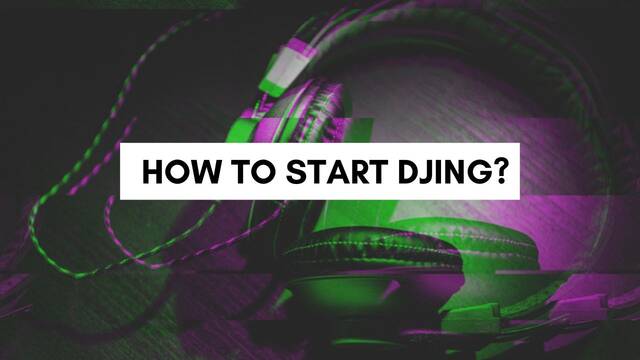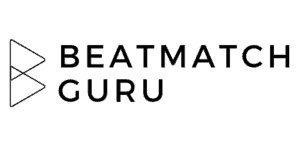
If you’re keen to start DJing and need a little help on where to start, there are a few easy steps for you to take and consider if you’re not there yet.
In this article you will learn the first few steps to help you get going on your new DJing skills, including DJ equipment, music collection and recording your DJ mix.
Click HERE to sign-up to get a FREE DJ progression checklist.
DJ Equipment
- Headphones
- DJ controller
- Device e.g. laptop / tablet / smartphone
- Speakers (optional if you’re happy to use laptop speakers from your laptop or listen to the mix in the MASTER setting on your headphones)
Start off with getting some DJ equipment, above is a suggested list to get you started and setup.
CLICK HERE to Read “essential DJ equipment for beginners” article that lists out in detail all of these components.
I will say this, in order to get started DJing, an app on your phone is only going to get you so far, it’s fun for sure but limits your skill development.
Buy a DJ controller, they’re inexpensive (especially when compared to the likes of CDJs and a DJ Mixer). Most budget mid-range DJ controllers are around $250-$300. My guess is that you’ve possibly got a laptop that you can download DJ software onto e.g. Rekordbox, and link it to say a Pioneer DDJ-400.
If you don’t have a laptop, then a smartphone is another option to connect to a DJ Controller, for example Pioneer DDJ-200 bluetooth connects to your smartphone with WEDJ software on it.
MNO? Money No Object? Then the world’s your oyster, get stuck into an All-In-One DJ controller or CDJs with DJ Mixer.
Wherever you start, as long as you’ve got a format in which to mix two, or more, tracks together, a pair of headphones, and speakers you’re in good shape to hone your DJing craft.
Sometimes it’s the simplest of DJ equipment that helps you build skill and have fun DJing.
Music
- Streaming subscription services
- Download e.g. Amazon, iTunes, Beatport
- Record pools
- Pick a genre or open format
Above highlights a few options to get you started to collate and even curate folders and playlists. Streaming from Soundcloud via your DJ software is so easy but can get messy when trying to create playlists. Downloading music is probably the most common format in which to collate music to start DJing with.
My advice is to have two phases:
- Research phase
- Set list build phase
First off, start by researching and listening to music that you love and feel would work together in a DJ mix. Keep a record of that music somehow, ready to either download the music or stream.
Then, secondly, arrange at least 60 minutes worth of DJ mixing tracks into a playlist. Run through your DJ music and consider organising them in order of the energy in which you want to play them in your DJ mix.
There’s no hard and fast rule here, you can always move around tracks in the setlist order while you’re DJing. It’s all good, you’ve got to go with the vibe man!
Tips for keeping track of inspiring music
- Listen to your favourite DJ producers mixes on YouTube. Check the track listing and take note of tracks that you love.
- Shazam music when you’re out and about to keep track of songs that you don’t know the name of.
- Spotify playlist – make note of tracks you want to DJ with and actually build a DJ mix within each playlist then buy all the tracks, that way you’ll be focussed and targeted on the tracks you want to put into a DJ mix.
Learning DJ Techniques
- Music theory
- Song structure
- Beat matching
- Phrase matching
Remember – you can learn slowly by yourself or learn with a step-by-step DJ course online.
Luckily, here at Beatmatch Guru, I’ve put together courses to help you get up and running ASAP.
For AMAZING DJ Courses that help YOU skip the YouTube DJ tutorial click-bait guff, and straight into a logical progression towards recording your very own DJ mix, quicker than you can say “CLICK HERE“.
Music theory helps you understand the building blocks of music, in order to figure out how and where to mix music together (song structure). Especially helpful if you like mixing around with different styles and genres of music.
Beat matching and phrase matching are by-products of music theory and sort you out with putting together seamless DJ mixes.
Learn DJing online with Beatmatch Guru HERE
Tip: Buying a course (of any type) requires you to put in effort to learn, practice, and repeat. Always return back to your online course if you forget things (there’s no shame in that). You don’t always need to remember everything, use a DJ course to refer back to
Recording a DJ Mix
- Record a DJ mix via your DJ software – it’s super easy and removes the need for externally connecting recording devices to your DJ equipment
As mentioned above, clicking on the record button on your DJ software is super easy to record a DJ mix.
Just remember to check the levels so that the coloured volume meter on the the DJ software is not redlining and is maxing out in the orange range. Otherwise the audio file at the end will sound distorted and horrible.
Getting Feedback
- Social media
- Friends
- Other DJs that are better than you
In order to get better at DJing, I really am an advocate for getting feedback to help you 10x the amount in which you learn about how you can improve your DJ mixes.
Everyone perceives things differently, which is a great thing really, because you’ll be able to get a different set of feedback to improve your DJ mixing skills and ultimately your DJ mixes.
Family usually are bias in some way or another. So maybe focus on friends feedback, who are into you style of music. Making friends with other DJs is valuable as you can get their feedback.
Of course, always feel free to reach out to Beatmatch Guru on YouTube, Facebook or email. Always here to help you out with DJing.
Regular Practice Time
Ideas to give you a good platform to practice your DJ mixes and get better at your newly acquired DJ skills.
- Practice with a friend – 2 heads are better than one
- DJ at open deck DJ nights in your local area
- Network with local DJ events in your genre
- Record every mix and critique your own DJ mixes
- Post your DJ mixes to YouTube, Mixcloud and social media
- Practice under pressure
- DJ live at a party e.g. house party
- DJ on live streams
- DJ on an online radio show
- Create a DJ podcast mix show – post weekly or at least regularly and commit to it
To acquire new skills, it takes practice, consistent practice. Not just the theory, but actually mixing music on a consistent basis. Trying new ideas of your own or following a set DJ mix transition for example.
Above in the points, I’ve highlighted some areas to spark some ideas to get you started DJing regularly and practice under pressure.
Honestly, to get really good results, at anything, but especially DJing is to put pressure on yourself when DJing. The more you get comfortable with being uncomfortable the better you will be DJing, especially in front of large crowds for example.
